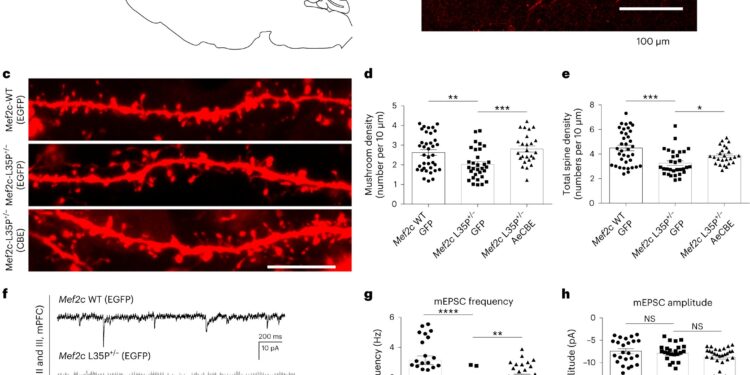Restoration of spine density and impairment of synaptic transmission in medial layers II and III neurons of the PFC in Mef2cL35P+/− mouse after AeCBE editing. Credit: Natural neuroscience (2023). DOI: 10.1038/s41593-023-01499-x
Researchers from Fudan University and the Chinese Academy of Sciences in Shanghai, China, conducted whole-brain genome editing aimed at correcting a single-base mutation associated with autism spectrum disorder (ASD) in mouse.
In a paper titled “Whole-brain in vivo base editing reverses behavioral changes in Mef2c mutant mice,” published in Natural neurosciencethe team details its groundbreaking advances in applied gene editing in vivo with illuminating implications for clinical neuroscience.
The study focuses on a single-base mutation within the MEF2C gene, a gene associated with ASD in humans. MEF2C is highly expressed in specific regions of the brain (cortex, hippocampus, amygdala) and plays a crucial role in neuronal development and synaptic plasticity.
Mutations in the MEF2C gene contribute to ASD because the altered gene impacts the stability of the MEF2C protein, leading to accelerated degradation of the protein. When an essential protein involved in neuronal structure is compromised, abnormal neuronal morphologies form, causing developmental deficits such as intellectual disability, speech impediments, and repetitive behaviors.
To change the configuration of the mutated genes, the team developed a base editing system called the AeCBE system (Apolipoprotein B mRNA-Editing Enzyme, Catalytic Polypeptide-embedded Cytosine Base Editor) to convert C·G base pairs to T ·A without causing any modifications. double-stranded DNA breaks. By not allowing double-strand breaks, the method reduces the chance of unplanned indels, additions, or deletions.
In experiments, mice carrying the Mef2cL35P mutation showed behavioral abnormalities mimicking ASD traits such as hyperactivity, repetitive behaviors and social abnormalities. Injection of AeCBE via crossing the blood-brain barrier with an adeno-associated virus successfully corrected the mutation in the mouse brain, restoring Mef2c protein levels in various brain regions and reversing the behavioral abnormalities.
These results represent a promising result for potential therapeutic approaches in the treatment of genetic brain disorders caused by single-gene mutations. The success of the method in living mice highlights its clinical relevance in the fight against genetic neurodevelopmental disorders in humans.
More information:
Wei-Ke Li et al, In vivo whole-brain base editing reverses behavioral changes in Mef2c mutant mice, Natural neuroscience (2023). DOI: 10.1038/s41593-023-01499-x
© 2023 Science X Network
Quote: Modifying the behavior of living mice by editing genes in the brain (December 4, 2023) retrieved December 4, 2023 from
This document is subject to copyright. Apart from fair use for private study or research purposes, no part may be reproduced without written permission. The content is provided for information only.



